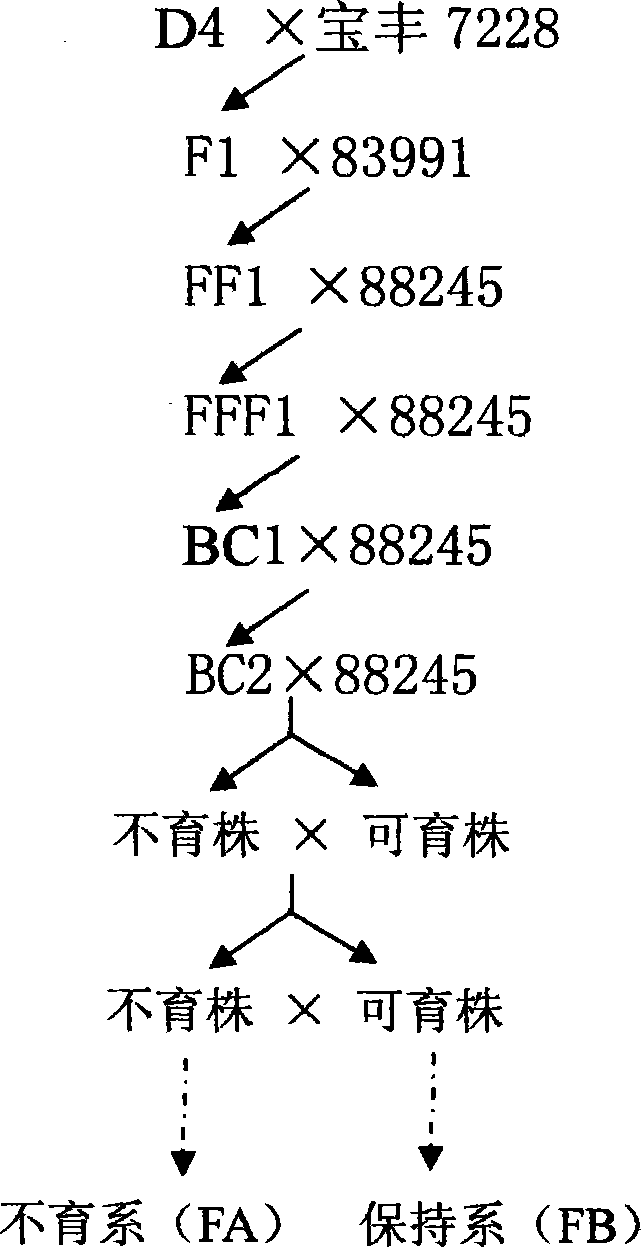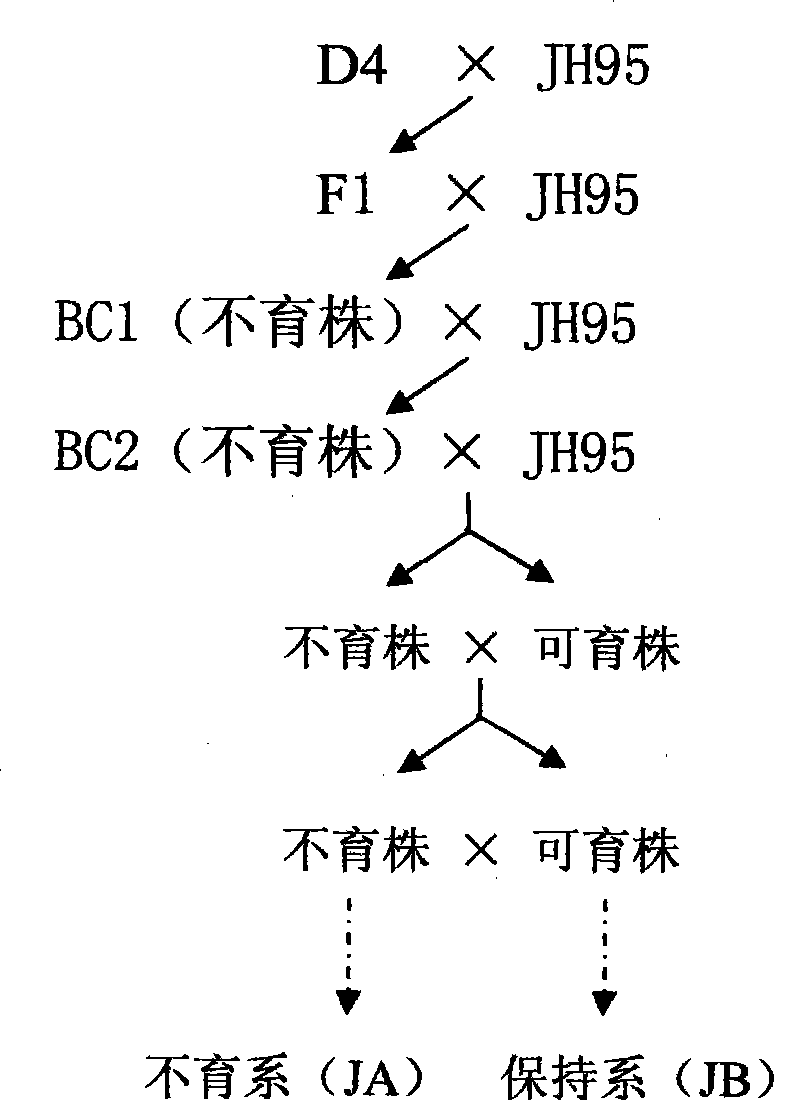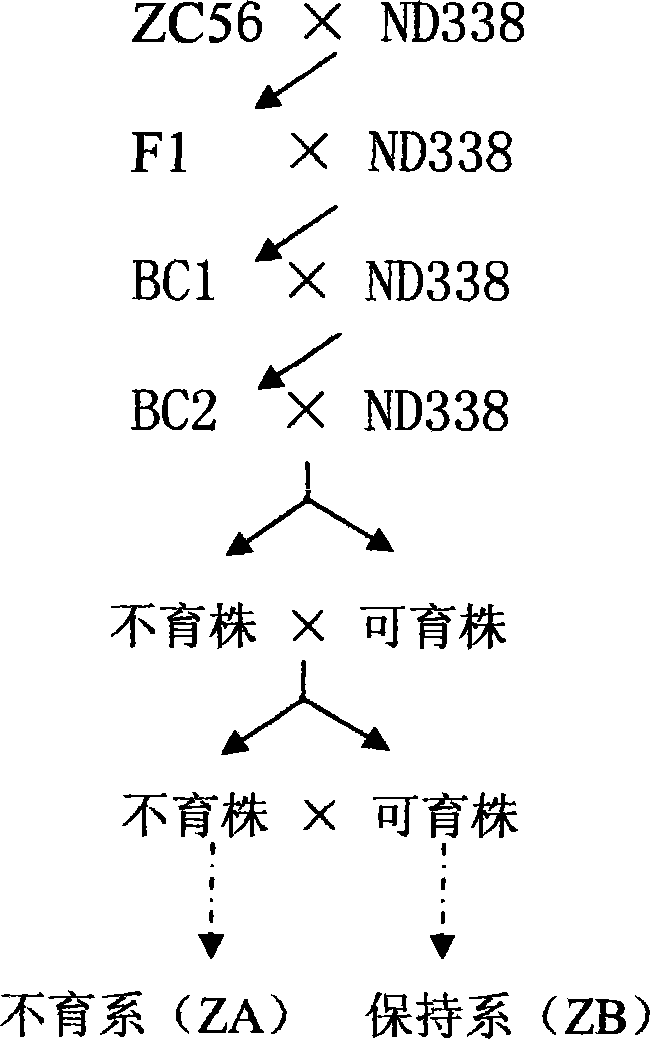Method for breeding male sterile line and maintainer line of wheat
A technology of male sterile line and maintainer line, applied in botany equipment and methods, plant genetic improvement, angiosperm/flowering plants, etc., can solve the problems of recovery, narrow source of recovery, and limitation of research and utilization of sterile lines
- Summary
- Abstract
- Description
- Claims
- Application Information
AI Technical Summary
Problems solved by technology
Method used
Image
Examples
Embodiment 1
[0030] Using the following materials as parents, cultivate the sterile line FA and the maintainer line FB:
[0031] 1. Parent 1: D4, there are a small amount (5%) of sterile plants in the population, the sterility of the sterile plants is 20%, and the closed glume pollination is poor.
[0032] 2. Parent 2: Baofeng 7228, there are a small amount (10%) of sterile plants in the population, the sterile plants have a sterility of 35%, small anthers, and less pollen.
[0033] 3. Parent 3: 83991, there are a small amount (9%) of sterile plants in the population, the sterile plants have a sterility of 20%, small anthers, and less pollen.
[0034] 4. Parent 4: 88245, common hexaploid wheat, used as a recurrent parent.
[0035] The selection process (eg figure 1 shown):
[0036] Using D4 as the female parent and Baofeng 7228 as the male parent, crossbreed to obtain F1; take the F1 as the female parent and 83991 as the male parent, crossbreed to obtain FF1; take the FF1 as the female ...
Embodiment 2
[0051] The following materials were used as parents to breed the sterile line JA (also known as Jing A) and the maintainer line JB:
[0052] 1. Parent 1: D4, there are a small amount (5%) of sterile plants in the population, the sterility of the sterile plants is 20%, and the closed glume pollination is poor;
[0053] 2. Parent 2: JH95, there are a small amount (7%) of sterile plants in the population, the sterile plants have a sterility degree of 15%, small anthers, and poor pollination of closed glumes, and are used as recurrent parents.
[0054] The selection process (eg figure 2 shown):
[0055] Take D4 as the female parent and JH95 as the male parent, and cross to obtain F1; use F1 as the female parent and JH95 as the male parent to backcross to obtain BC1; use the sterile plant in BC1 as the female parent, and use JH95 as the male parent Backcross to get BC2; use the sterile line in BC2 as the female parent and JH95 as the male parent. Plant the backcross progeny pop...
Embodiment 3
[0067] Using the following materials as parents, cultivate the sterile line ZA (also known as Zi A) and the maintainer line ZB:
[0068] 1. Parent 1: ZC56, the grain color is medium purple, there are a small amount (20%) of sterile plants in the population, the sterility of the sterile plants is 25%, and the anthers are small.
[0069] 2. Parent 2: ND338, a hexaploid white-grained wheat variety, has a small amount (15%) of sterile plants in the population, and is sterile at the tip of the panicle, with a sterility degree of 15%, and is used as a recurrent parent.
[0070] The selection process (eg image 3 shown):
[0071] ZC56 as the female parent and ND338 as the male parent were crossed to obtain F1; F1 was used as the female parent and ND338 was used as the male parent to backcross twice. Plant the backcross progeny population (4000 plants), select sterile and fertile plants from the backcross progeny population, test cross in pairs, and plant the first generation of tes...
PUM
 Login to View More
Login to View More Abstract
Description
Claims
Application Information
 Login to View More
Login to View More - R&D
- Intellectual Property
- Life Sciences
- Materials
- Tech Scout
- Unparalleled Data Quality
- Higher Quality Content
- 60% Fewer Hallucinations
Browse by: Latest US Patents, China's latest patents, Technical Efficacy Thesaurus, Application Domain, Technology Topic, Popular Technical Reports.
© 2025 PatSnap. All rights reserved.Legal|Privacy policy|Modern Slavery Act Transparency Statement|Sitemap|About US| Contact US: help@patsnap.com



